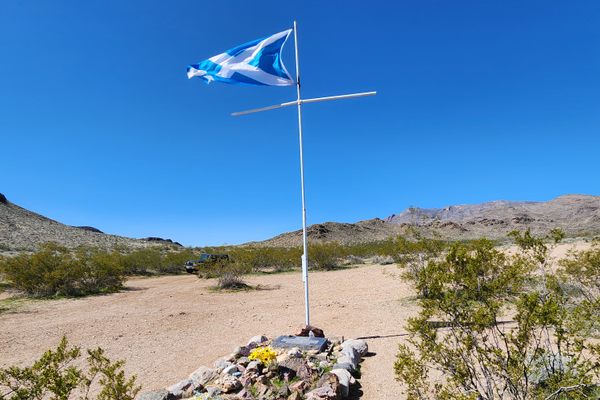James Davidson and his wife Maria joined the Church of Jesus Christ of Latter-Day Saints in Scotland, and emigrated to Utah with their son Joseph in about 1866. James was a skilled machinist who was heavily involved with the attempts to spin cotton into cloth in southern Utah, as part of the efforts by the LDS church to make their community self-sufficient. He and his family had gone to St. Thomas, about 60 miles southwest of St. George, presumably in an effort to persuade the church members there to grow more cotton for the mill.
On their return, they were to accompany a group back to St. George, but lost a tire between St. Thomas and St. Joseph (now Logandale). (A “tire” in the 19th century was the metal band that encircled the wheel.) Because of the ensuing delay, they evidently missed connections with their party and headed back to St. George on their own.
There were two routes to St. George, one along the Virgin River and a newer one that cut across Mormon Mesa to a well in Beaver Dam Wash, then continued on to St. George more or less along the route much later followed by US-91. The Virgin River route had the advantage of ample water, but also many treacherous fords with quicksand. The Mormon Mesa route was shorter and firmer, but the stretch to Beaver Dam Wash, some 30 miles, was completely waterless. Bringing plenty of water was imperative, particularly because the horses would need it too, and parties were advised not to attempt the route alone.
For some reason, however, the Davidsons chose the Mormon Mesa route, possibly because they thought it would be quicker. They did not bring anywhere near enough water, probably through being unfamiliar with conditions in the southern Nevada desert in June, where temperatures routinely exceed 100 degrees Fahrenheit (38 degrees Celsius) and relative humidity can drop into single digits. In a catastrophic misjudgment, they may even have skimped on water to save weight.
Even so, they might have made it, except the carriage broke a wheel. Evidently, Joseph set out with the horse and remaining water to find help, and almost succeeded. A group working on Beaver Dam Well found a thirst-crazed horse on June 12th. They watered the horse and kept it, assuming its owner would show up. When no one did, they went searching and found Joseph’s body about half a mile away. They then mounted a search for his parents, who were found to have died under a jury-rigged blanket shelter to keep off the sun.
James and Maria were buried where they were found, and Joseph was later re-interred alongside his parents. Their grave has been marked to this day and is maintained by volunteers. A Scottish flag often flies over the site, in recognition of their homeland.
Know Before You Go
Follow Interstate 15 1.9 miles west from the intersection with State Route 170 (the Riverside Road, exit 112) to the truck parking area where the freeway tops out onto Mormon Mesa. Exit right into the parking area, where there is a gate through the fence giving access to the frontage road on the north. Follow the frontage road west 1.4 miles where it makes a right-angle bend northward. Here it becomes Halfway Wash Road. Follow it 6.8 miles north; the road will wind around some but always trends northerly. At this point (about 36.86253 N, 114.30368 W) there is an intersection with an installation off the road to the left. Keep right here and proceed 2.5 miles to a intersection (at about 36.88487, 114.27156 W) with a primitive road on the right. Follow the primitive road a bit less than half a mile to the gravesite. It should be visible from a distance because a Scottish flag will probably be flying.
These roads will require high clearance but probably not 4wd, at least in dry weather.

